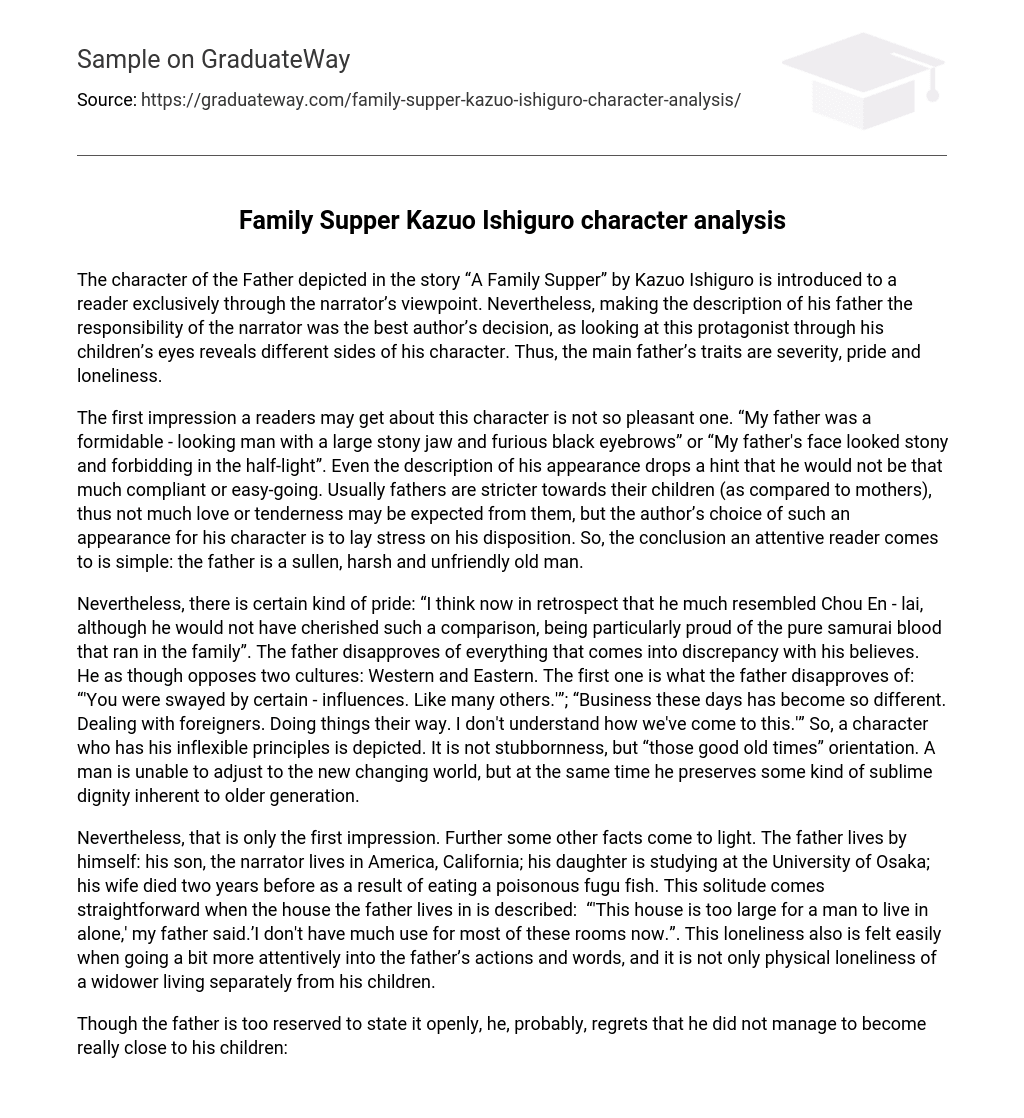The character of the Father depicted in the story “A Family Supper” by Kazuo Ishiguro is introduced to a reader exclusively through the narrator’s viewpoint. Nevertheless, making the description of his father the responsibility of the narrator was the best author’s decision, as looking at this protagonist through his children’s eyes reveals different sides of his character. Thus, the main father’s traits are severity, pride and loneliness.
The first impression a readers may get about this character is not so pleasant one. “My father was a formidable – looking man with a large stony jaw and furious black eyebrows” or “My father’s face looked stony and forbidding in the half-light”. Even the description of his appearance drops a hint that he would not be that much compliant or easy-going. Usually fathers are stricter towards their children (as compared to mothers), thus not much love or tenderness may be expected from them, but the author’s choice of such an appearance for his character is to lay stress on his disposition. So, the conclusion an attentive reader comes to is simple: the father is a sullen, harsh and unfriendly old man.
Nevertheless, there is certain kind of pride: “I think now in retrospect that he much resembled Chou En – lai, although he would not have cherished such a comparison, being particularly proud of the pure samurai blood that ran in the family”. The father disapproves of everything that comes into discrepancy with his believes. He as though opposes two cultures: Western and Eastern. The first one is what the father disapproves of: “’You were swayed by certain – influences. Like many others.’”; “Business these days has become so different. Dealing with foreigners. Doing things their way. I don’t understand how we’ve come to this.’” So, a character who has his inflexible principles is depicted. It is not stubbornness, but “those good old times” orientation. A man is unable to adjust to the new changing world, but at the same time he preserves some kind of sublime dignity inherent to older generation.
Nevertheless, that is only the first impression. Further some other facts come to light. The father lives by himself: his son, the narrator lives in America, California; his daughter is studying at the University of Osaka; his wife died two years before as a result of eating a poisonous fugu fish. This solitude comes straightforward when the house the father lives in is described: “’This house is too large for a man to live in alone,’ my father said.’I don’t have much use for most of these rooms now.”. This loneliness also is felt easily when going a bit more attentively into the father’s actions and words, and it is not only physical loneliness of a widower living separately from his children.
Though the father is too reserved to state it openly, he, probably, regrets that he did not manage to become really close to his children: “’That seems odd,’ I said.’You were always so busy.’ ‘Too busy perhaps.’ He looked at me with a small smile. ‘Perhaps I should have been a more attentive father.’”. Again, it is quite obvious that the father would like his children to come back to live with him: “’I’m glad in any case that you’ve decided to come back,’ my father said. ‘More than a short visit, I hope.’ ‘I’m not sure what my plans will be.’ ‘I for one am prepared to forget the past.”. A reader may even feel some sympathy towards the father: “’If you wish to stay here, I mean here in this house, you would be very welcome. That is, if you don’t mind living with an old man.’”.
Despite the fact that the father could look so strong and deserved at first sight, it is implied that he is left alone, and though his children do feel filial love and respect towards him, they are not so much eager to share either his beliefs or his life. The narrator’s sister, Kikuko, already has her own choices: “’Well. I’ve got lots of friends now in Osaka. I like it there. I’m not sure I want to leave them all behind just yet.”. The son is also indecisive about his future. This is rather natural – when children are ready to build their own future separately, the parents have difficulties accepting it. Meanwhile, the father is left with his loneliness, his pride and, maybe, a bit of hope: ‘Things will improve then.’ ‘Yes, I’m sure they will.’
Work Cited Page
Ishiguro, Kazuo “A Family Supper.” Firebird 2. In The Penguin Book of Modern Short Stories. Ed. Malcolm Bradbury. Harmondsworth: Penguin, 1988. 434-42. Retrieved March 26, 2006 from http://www.mujweb.cz/zabava/filthilion/Family%20Supper.htm





